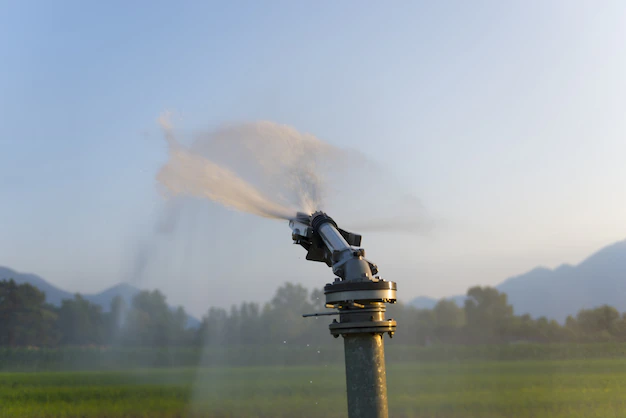Irrigation systems play a crucial role in modern agriculture by providing water to crops in a controlled manner. They are of paramount importance for agricultural practices in areas where rainfall is insufficient or unreliable. Here are some key reasons why irrigation systems are vital in agriculture:
- Water management: Irrigation systems enable farmers to effectively manage water resources by delivering water directly to crops when needed. They provide a consistent and reliable water supply, reducing the dependence on unpredictable rainfall patterns. This allows farmers to optimize water usage, ensuring that crops receive adequate moisture for their growth and development.
- Increased crop yield: Irrigation systems help to maximize crop productivity by providing a continuous water supply throughout the growing season. Adequate water availability promotes healthy plant growth, nutrient uptake, and photosynthesis, which ultimately leads to increased yields and improved crop quality. Irrigation also allows farmers to grow crops in arid and semi-arid regions that would otherwise be unsuitable for cultivation.
- Crop diversification and flexibility: With irrigation, farmers have the flexibility to grow a wide range of crops throughout the year, regardless of the natural rainfall patterns or seasonal variations. They are not limited to rain-fed crops and can cultivate high-value cash crops, fruits, vegetables, and other water-intensive crops. This diversification can enhance farm profitability and food security.
- Risk mitigation: Irrigation systems help farmers mitigate the risks associated with droughts, erratic rainfall, and climate change. By having control over water supply, farmers can reduce the vulnerability of their crops to water scarcity and ensure a more stable and consistent harvest. This contributes to the overall resilience of agricultural systems and farmers’ livelihoods.
- Efficient resource utilization: Modern irrigation techniques, such as drip irrigation and precision sprinklers, are designed to deliver water directly to the plant roots, minimizing water wastage through evaporation or runoff. These systems improve water use efficiency, reduce water consumption, and lower the overall environmental impact of agriculture.
- Soil health and fertility: Irrigation can support soil health by maintaining adequate soil moisture levels, particularly during critical growth stages. Proper moisture content in the soil promotes nutrient availability and uptake by plants, fostering optimal growth and nutrient utilization. Additionally, irrigation can help leach out excess salts from the soil, preventing soil salinization, which can be detrimental to crop growth.
- Agricultural development and food security: Irrigation systems are instrumental in increasing agricultural production and meeting the growing global demand for food. By expanding irrigated areas, countries can enhance their agricultural output, reduce dependence on food imports, and achieve greater food self-sufficiency. This is particularly significant in regions with rapidly growing populations and limited arable land.
In summary, irrigation systems are essential for modern agriculture as they provide controlled and reliable water supply, support crop growth, mitigate risks, optimize resource utilization, enhance soil health, and contribute to agricultural development and food security.







